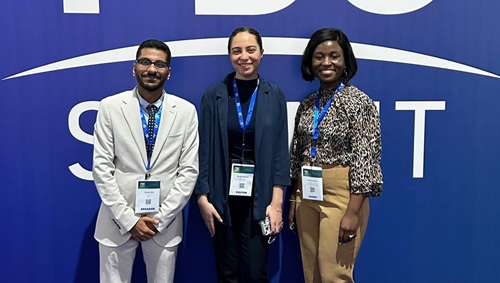The Africa Center for Digital Transformation (ACDT) has emerged as a key voice in Africa’s digital innovation landscape, leading a groundbreaking Research Forum on Digital Twin technologies at the Future of Digital Countries Summit held in Cairo on April 29, 2025.
The forum, spearheaded by Dr Shady Adib, a Research Associate at ACDT with a PhD in Civil Engineering and a specialisation in Digital Twin systems, brought together global experts, policymakers, scholars, and private sector stakeholders to explore the transformative potential of virtual replicas in building smart infrastructure and resilient economies across Africa.
“In Africa, the urgency for digitally informed planning is not theoretical, it is existential,” Dr Adib remarked during his presentation. “Digital Twin technologies offer us the rare opportunity to leapfrog traditional development bottlenecks by using real-time data and simulation models to anticipate failures, optimise systems, and enhance public service delivery.”
Drawing on ACDT’s pioneering research and pilot projects, Dr Adib illustrated how Digital Twins can help African cities and governments modernise infrastructure planning, climate resilience strategies, and public service optimisation through predictive analytics and virtual simulations.
The forum also highlighted ACDT’s growing role in shaping Africa’s digital transformation by merging academic research, policy influence, and practical implementation. Delegates from North, East, and Southern Africa engaged in a lively panel discussion with Dr Adib on the applications of Digital Twin systems in sectors such as transportation, water infrastructure, healthcare, and agriculture.
Participants called for stronger cross-border research collaboration, with institutions like ACDT leading the charge to foster knowledge sharing and technological adoption tailored to local development needs. ACDT was praised for its efforts in hosting fellowships, developing digital policy toolkits, and mentoring the next generation of African technology researchers.
Dr Adib stressed the need for homegrown solutions, stating, “Africa’s digital future must not rely on imported models alone. Our research is not an end. It is a call to action for governments, academia, and industry to build together, better, and smarter.”
He concluded the session by affirming ACDT’s commitment to data-informed, human-centred, and future-oriented innovation. “We are not simply participating in the digital future, we are shaping it.”
ACDT’s leadership at the summit cemented its status as a continental hub for digital innovation, with the Cairo forum underscoring the critical role of African-led research in shaping global digital development. As the continent accelerates towards digital sovereignty, events like this reinforce that Africa’s future is being designed not only in boardrooms but in labs, data centres, and collaborative platforms driven by bold ideas and shared vision.

